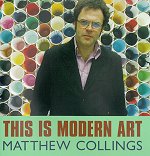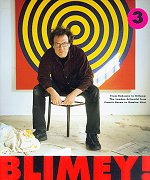Pablo Picasso was never called an asshole | |
 |
I like the fact that when Kevin writes something about, for example, what he's been reading recently, he takes the opportunity to also dish out little belittling asides at a few of the things mentioned by others in these pages. I like this because it fights complacency and because it's good to have someone whose opinions you hold in high regard take you to task. It's good too because they often make strange claims themselves that really don't hold up to scrutiny. Take Kevin's own recent piece on the books he's been reading, and his suggestion that John Milne is some kind of inheritor of the Chandler crown. Having heard Milne read from his books I can only say that I was singularly unimpressed by what I heard. Perhaps appreciation is aided by being from in or around the London he writes about, but frankly I don't care. It left me cold. And wasn't 'Alive and Kicking' the title of a Simple Minds song? I haven't been reading very much recently. I have been spending most of my time working on these pages and creating visuals for various projects, and that's good, although it's bad too. Actually that's not quite true because I have been reading a fair bit, it's just that I've not been reading any fiction and I'm not sure if that's bad or not: I do worry because it's a male thing and I don't particularly like that kind of thing. I mean being overtly masculine. I don't do it very well. Except for the things like making lists and memorising details and information, which I do very well, on the whole. Except for the important things that I forget. Like when to stop wittering on about rubbish. I've been reading Art books recently, and that's interesting because I never much liked reading Art books when I was younger because they were always written in dull ways, giving dense and hence almost meaningless biographical information alongside difficult and impenetrable tracts of historical theory. I'm not sure if the change in feeling has come about because I'm getting older and my opinions are changing or if it's because Art books are being written in better ways, or if it's a combination of the two. I suspect it's more the latter because I have always been quite picky and boring about what I like and don't like. I'm like Kevin in that respect: someone mentioning the Waterboys in a book will put me off too. |
 | Whereas someone mentioning Jonathan Richman in a book will almost always impress me. Matthew Collings mentions Jonathan Richman in his book This Is Modern Art, and if you watched the Channel 4 TV show of the same name you'll have seen him talk about Jonathan Richman on the screen too. I was excited when I saw that on TV and I was very pleased that the allusion was used in the book as well. Collings should have expanded on the Richman thing, and brought in what Jonathan said about going to the Museum of Fine Art in Boston to chat up the beautiful Boston Art students, which would have been fitting because he was talking about ideas of 'beauty' and 'prettiness' and it would have made sense. Of course there's also the connections to Warhol through the VU, but that's another matter, and I suppose you have to remember that people would be expecting the book or the TV show to be about Art and not about fairly obscure underground Pop and rock, which is a shame, but there you go. It seems that Matthew Collings has undergone something of a transformation in recent years, at least if his older articles for Modern Painters are anything to go by. He perhaps learned to wear his porkchops and slightly crumpled suits with more panache, which perhaps is a somewhat unkind thing to suggest, but it's certainly true to say that his personal re-invention has worked and that it's a great Pop / Punk thing to do and that's of course a great compliment. It's been a great compliment to have people say to me 'oh, you know, Collings writes a lot like you do'. At least it is until I realise that he's making TV shows and having books published and I'm still teaching kids about Art. Which actually isn't so bad, and actually too it's been good reading Collings' books and teaching Art because he makes such interesting and good connections between things, which is part of what good learning is about, and really too Collings would make a great Art teacher. As long as he could take the jibes about his porkchops and his age and his lack of connections with the 'real world'. His links between Matisse and Heron and Basquait are good, and there's a lot of mileage in that idea within the classroom situation. I digress. |
 | It should be a compliment to suggest that Collings has been reading Kevin Pearce's writings on music and books. He taps the same vein of highly informed, snappy, connective journalism, and it's great to read. You get the things you need to know and you feel a passion and an excitement about the subjects, and Collings makes you want to see the Art, like you want to hear the records and read the books that Kevin mentions (Milne exceptedÉ). I suggest too that Collings' prototype for his three books (Blimey, It Hurts, This Is Modern Art) is Kevin's own magical Something Beginning With 'O', a book that shook expectations about what a music book should be about, and which set the pace for others to follow. Phrases like 'naturally unnatural' and 'it all made sense' are so redolent of the language of O it hurts, which is fitting because that's the title those phrases come from. If there's a possible criticism to be levelled at Collings, it might be that his writing about Art is another example of the dumbing down of culture; the over-simplification of connections and meanings strips meaning away and leaves only decoration. But really that's possibly an argument that lives in a time left behind; a time where ideas of high and low culture were propagated by those with too many vested interests and agendas. Perhaps not. What counts most is that Collings' books are exciting and compulsive, at least for Artists, and they made me want to rush out and look and create more myself. For a moment too I thought it was a feeling that was transferable; that anyone could read these books and be excited about Art because they are full of accessible and direct writing. I might still be right about that but I fear not; I fear that there is still something strangely impenetrable about Art and about Artists and their ideas and about the language of Art, and that although part of me wants to break through those barriers I think too that the barriers are important and integral to Art in the first place. But those barriers don't have to be as po-faced and tightly intellectualised as they have been in the past, and that, more than anything else, should be the most lasting idea to come out of Collings' books. © Alistair Fitchett 2000 |